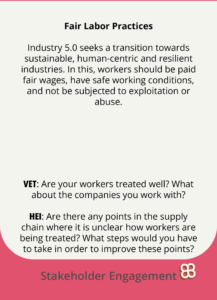Fair labor practices
Fair labor practices, in the context of the fashion domain, refer to the ethical and responsible treatment of workers involved in the production and supply chain of fashion products. It encompasses various aspects such as ensuring safe working conditions, fair wages, reasonable working hours, and respect for workers’ rights.
Incorporating the ideology of Industry 5.0, fair labor practices go beyond mere compliance with legal requirements and strive to create an environment where workers are valued, respected, and empowered. This approach recognizes the importance of human capital in the fashion industry and emphasizes the need for collaboration and harmonious relationships between workers, management, and technology.
Fair labor practices in the fashion industry aim to address the challenges and negative impacts associated with traditional labor practices, such as exploitation, unsafe working conditions, and inadequate wages. It advocates for transparency and accountability throughout the supply chain, from raw material sourcing to the final product’s manufacturing and distribution.
Companies that uphold fair labor practices prioritize the well-being of their workers, ensuring that they receive fair compensation for their efforts and have access to social protections. They promote inclusivity and diversity, fostering an environment that is free from discrimination and harassment. Moreover, they provide opportunities for workers to voice their opinions, participate in decision-making processes, and contribute to continuous improvement initiatives.
By embracing fair labor practices, the fashion industry can contribute to the achievement of sustainable development goals, such as decent work and economic growth, reduced inequalities, and responsible consumption and production. It acknowledges the importance of balancing technological advancements and automation with the preservation of human dignity and well-being.
Overall, fair labor practices align with the ideology of Industry 5.0, which emphasizes the harmonious integration of technology and human workforce. It recognizes that the well-being and empowerment of workers are essential for the sustainable and responsible growth of the fashion industry.
Case studies
Eileen Fisher
Eileen Fisher is a women’s clothing brand that places a strong emphasis on ethical sourcing and production. They have a robust social consciousness program that focuses on fair labor practices, including fair wages, safe working conditions, and worker empowerment. Eileen Fisher also partners with various organizations to support women’s rights and social initiatives.
Everlane
Everlane is a fashion retailer known for its commitment to transparency and ethical practices. They provide detailed information about their factories and suppliers, including their wages and working conditions. Everlane ensures fair wages and ethical treatment of workers throughout their supply chain, and they work with certified factories that meet their rigorous standards.
Fair Trade Certified
Fair Trade Certified is a certification organization that works with various fashion brands to ensure fair labor practices. They set standards for fair wages, safe working conditions, and community development. Many fashion companies, such as prAna and Pact, have partnered with Fair Trade Certified to ensure that their products are made under fair labor conditions.
Worker-driven Social Responsibility (WSR)
WSR is an innovative model that empowers workers to hold companies accountable for fair labor practices. The WSR approach involves establishing independent monitoring organizations that are led by workers themselves. Companies like GoodWeave and Ethical Toy Program have implemented WSR programs to ensure fair treatment and empower workers in their respective industries.
References
Athreya, Bama. “Can fashion ever be fair?.” Journal of Fair Trade 3.2 (2022): 16-27.
Kam, Seonju, and Youngsun Yoo. “Practice of sustainable fashion design considering customer emotions and personal tastes.” Frontiers in Psychology 13 (2022): 976471-976471.
Smestad, Liat. “The sweatshop, child labor, and exploitation issues in the garment industry.” Fashion Practice 1.2 (2009): 147-162.
Bick, Rachel, Erika Halsey, and Christine C. Ekenga. “The global environmental injustice of fast fashion.” Environmental Health 17 (2018): 1-4.
Speed, Alexandra Grace. “Impact of fast fashion and international law on workers and the environment.” (2021).
